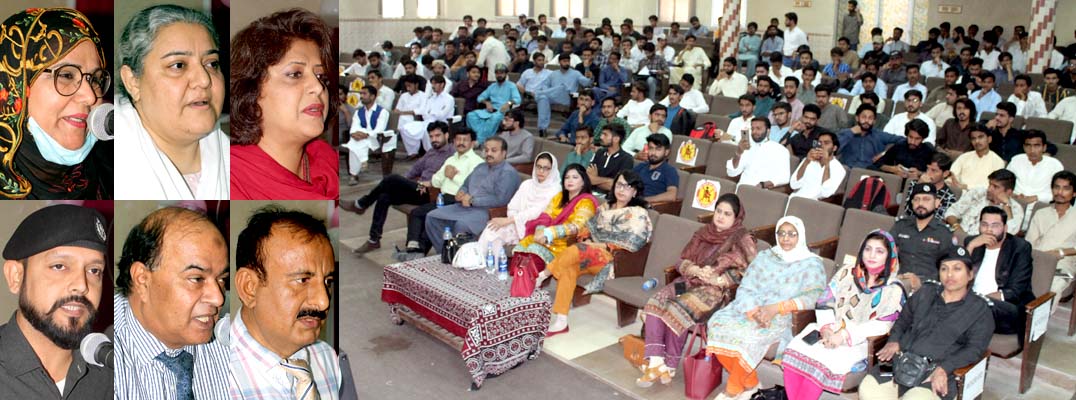
International Women’s Day: Issues pertaining to working women across Sindh highlighted at a seminar held at SU
Speakers at a seminar here on Wednesday highlighted the issues being faced by the working women in Sindh and said that ladies were able to achieve and fulfill every task more professionally either in their family or in professional life.
They said that women should convince their family members to allow them to get a decent job and contribute to nation building adding that a woman could not secure a well-brought-up employment without self-confidence and courage.
This they said while addressing the seminar titled “International Women’s day- Break the bias” organized by the sociological society of department of sociology, University of Sindh in collaboration of Bureau of Students’ Tutorial, Guidance, Counseling Services and Co-curricular Activities (STAGS) at Shaikh Ayaz Auditorium, Arts Faculty Building of the varsity.
Addressing the seminar women rights activist Prof. Dr. Arfana Begum Mallah said that the purpose of the programme was to teach and transfer their knowledge and experience to the younger generation.
She maintained that women should choose new professions and establish their own businesses to play a vital role in the socio-economic development of the country.
She encouraged the students to join those departments and organisations where women were doing fewer jobs due to social barriers.
“I feel honoured to work for women who have suffered and faced gender-based violence in society. I encourage women to raise their voice for their protection and empowerment in society,” she added.
Dr. Mallah also highlighted the issues pertaining to the women in Sindh and Pakistan and said that women had the ability to perform their duty at home as well as in any organisation.
She added that women were performing their role as working women in every sphere of life which was a roadmap for female graduates in future.
“Sufi poet Shah Abdul Latif Bhittai has greatly valued and cherished the women and he has talked about seven heroines in his poetry; not any single man has been taken as hero by the poet. This shows the importance and Bhittai’s respect for females”, she said.
Director Institute of Gender Studies Prof. Dr. Misbah Bibi Qureshi said there were four types of violence — physical, psychological, sexual and one caused by deprivation. She said women should be aware of them.
She said women led a life of constant stress which affected their health adding that they didn’t relate violence to a chronic disease whereas new data suggested that 15 to 20 percent ailments were caused by a violent environment
She said constant stress caused [women’s] body to compromise which destroyed its immune system adding that some political and religious forces did not want ladies to get their due status and be treated as men’s equal, because if that happened, they won’t be able to raise their hand on women.
Chairperson Anti-harassment Cell & Director Institute of Biochemistry Prof. Dr. Naseem Aslam Channa called women’s plight a ‘joint story’, arguing that things were not different in Pakistan than other underdeveloped countries. She said Pakistani society was a male-fixated one where women were groped, touched and whistled at.
She said that women ought to acquire knowledge of the laws impacting their lives and urged the government to enforce the rules aimed at women’s empowerment.
She also favoured establishment of separate sections at police stations for women’s complaints to save women from harassment by policemen.
Chairman Department of Sociology Prof. Dr. Hamadullah Kakepoto said all important sectors of society, including the legislature and the judiciary, were male-dominant while the electronic media didn’t portray a positive image of women.
“The 18th constitutional amendment has brought about great changes but the provinces have not done sufficient legislation to ensure protection of women’s rights,” he noted.
Highlighting services of the late Benazir Bhutto, he said under her visionary leadership, the country saw the establishment of banks and police stations exclusively for women.
Sindh University’s Controller of Semesters Examinations Muhammad Mashooque Siddiqui said the problems faced by women in Muslim countries including Pakistan were primarily owing to their societal structures and had nothing to do with the religion.
“Islam is the only religion that granted equal rights to women at a time when they were buried alive,” he said.
Desk incharge of Police’s Girls Rescue Centre (GRC) Assistant Sub Inspector Fayaz Hussain highlighted the steps taken by the centre to play a pivotal role in diminishing the harassment issues at all educational institutions of Jamshoro. He apprised the female students of registering complaints immediately at GRC if some unpleasant incident takes place with them.
A large number of female faculty members and students were present on the occasion.